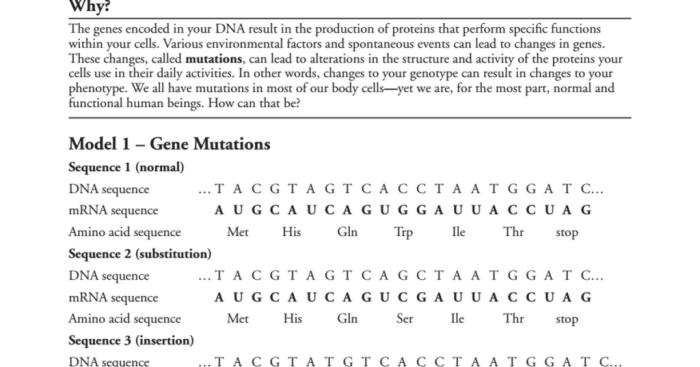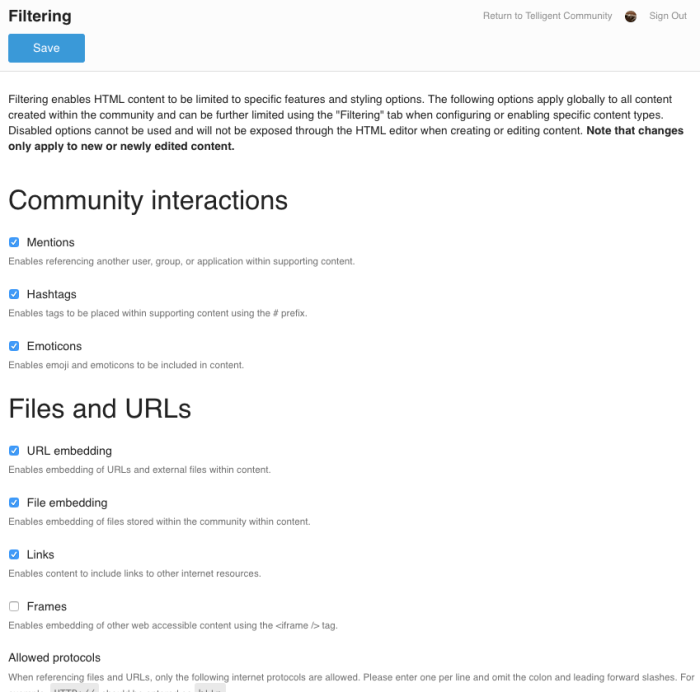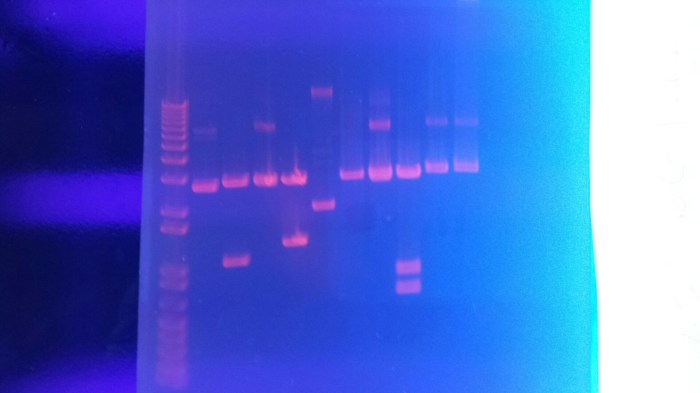Unveiling the mysteries of genetic diversity, the gene mutation POGIL answer key unlocks the secrets of how our genes shape who we are. This comprehensive guide delves into the fascinating world of gene mutations, exploring their causes, consequences, and the profound implications they hold for our health and well-being.
Delve into the depths of genetic science as we uncover the mechanisms behind gene mutations, their potential to influence our traits and predispositions, and the cutting-edge technologies used to detect and analyze these genetic variations.
Gene Mutation

Gene mutation refers to a change in the DNA sequence of an organism, affecting the structure or function of a gene. These changes can have varying effects, from no noticeable impact to severe consequences.
Examples of gene mutations include:
- Single nucleotide polymorphism (SNP):A change in a single nucleotide base pair.
- Insertion:Addition of one or more nucleotides into the DNA sequence.
- Deletion:Removal of one or more nucleotides from the DNA sequence.
Types of Gene Mutations, Gene mutation pogil answer key
Gene mutations can be classified into several types based on their impact on the gene:
- Silent mutations:Do not alter the amino acid sequence of the protein produced by the gene.
- Missense mutations:Change a single codon, resulting in a different amino acid being incorporated into the protein.
- Nonsense mutations:Introduce a stop codon, causing premature termination of protein synthesis.
- Frameshift mutations:Insert or delete nucleotides, causing a shift in the reading frame and potentially altering the entire protein sequence.
Causes of Gene Mutation
Gene mutations can arise from various factors, including environmental influences and errors during DNA replication. Understanding these causes is crucial for comprehending the mechanisms of genetic variation and its implications for living organisms.
Environmental Factors
Environmental factors such as radiation, chemicals, and certain viruses can interact with DNA, causing structural changes or damage that can lead to mutations. For instance, exposure to ultraviolet (UV) radiation from sunlight can induce the formation of thymine dimers, which are abnormal bonds between adjacent thymine bases in DNA.
If these dimers are not repaired promptly, they can result in errors during DNA replication, potentially leading to gene mutations.
DNA Replication Errors
DNA replication is a complex process that involves the accurate copying of genetic information from one DNA molecule to another. However, occasional errors can occur during this process, leading to gene mutations. These errors can arise from various mechanisms, such as the misincorporation of nucleotides, slippage during replication, or errors introduced by enzymes involved in DNA synthesis.
For example, DNA polymerase, the enzyme responsible for synthesizing new DNA strands, can occasionally make mistakes, resulting in the insertion, deletion, or substitution of nucleotides.
Consequences of Gene Mutation: Gene Mutation Pogil Answer Key

Gene mutations can have a wide range of effects on gene function, depending on the type of mutation and the location of the mutation within the gene. Some mutations may have no effect on gene function, while others may lead to a loss of function or a gain of function.
Mutations that lead to a loss of function can result in genetic disorders. Genetic disorders are conditions that are caused by a mutation in one or more genes. Genetic disorders can be inherited or acquired. Inherited genetic disorders are passed down from parents to children through their genes.
Acquired genetic disorders are caused by mutations that occur after birth.
The implications of gene mutations for human health are significant. Gene mutations can lead to a wide range of health problems, including birth defects, developmental disorders, and cancer.
Genetic Disorders
Genetic disorders are conditions that are caused by a mutation in one or more genes. Genetic disorders can be inherited or acquired. Inherited genetic disorders are passed down from parents to children through their genes. Acquired genetic disorders are caused by mutations that occur after birth.
- Inherited genetic disordersare caused by mutations that are present in the DNA of both parents. These mutations can be passed down to children through either the sperm or the egg.
- Acquired genetic disordersare caused by mutations that occur after birth. These mutations can be caused by a variety of factors, including exposure to toxins, radiation, and viruses.
Genetic disorders can affect any part of the body and can range in severity from mild to life-threatening. Some common genetic disorders include:
- Cystic fibrosisis a genetic disorder that affects the lungs, pancreas, and other organs. Cystic fibrosis is caused by a mutation in the CFTR gene.
- Sickle cell anemiais a genetic disorder that affects the blood cells. Sickle cell anemia is caused by a mutation in the HBB gene.
- Huntington’s diseaseis a genetic disorder that affects the brain and nervous system. Huntington’s disease is caused by a mutation in the HTT gene.
Implications for Human Health
Gene mutations can have a significant impact on human health. Gene mutations can lead to a wide range of health problems, including birth defects, developmental disorders, and cancer.
If you’re searching for the gene mutation pogil answer key, you might also be interested in the fascinating tale of “cual es la historia del silbon.” This intriguing story, available at here , will transport you to a world of folklore and intrigue.
However, don’t forget to return to the gene mutation pogil answer key for the solutions to your academic queries.
- Birth defectsare physical or mental defects that are present at birth. Birth defects can be caused by a variety of factors, including gene mutations.
- Developmental disordersare conditions that affect the development of the brain and nervous system. Developmental disorders can be caused by a variety of factors, including gene mutations.
- Canceris a disease that is characterized by the uncontrolled growth of cells. Cancer can be caused by a variety of factors, including gene mutations.
The implications of gene mutations for human health are significant. Gene mutations can lead to a wide range of health problems, including birth defects, developmental disorders, and cancer. It is important to understand the causes and consequences of gene mutations in order to develop effective treatments for genetic disorders.
Detection and Analysis of Gene Mutations

The detection and analysis of gene mutations are crucial for understanding the genetic basis of diseases and developing personalized treatments. Various techniques are employed to identify and characterize these mutations.
Techniques for Detecting Gene Mutations
- DNA Sequencing:This technique determines the exact sequence of nucleotides in a DNA sample. By comparing the sequence to a reference genome, mutations can be identified.
- PCR (Polymerase Chain Reaction):PCR amplifies specific regions of DNA, allowing for targeted sequencing and detection of mutations.
- Microarrays:Microarrays contain probes that bind to specific DNA sequences. Mutations can be identified by comparing the binding patterns of samples to a reference.
- Next-Generation Sequencing (NGS):NGS technologies rapidly sequence large amounts of DNA, enabling the detection of multiple mutations simultaneously.
Genetic Testing for Gene Mutations
Genetic testing is used to identify individuals who carry specific gene mutations associated with inherited diseases. This information can be used for:
- Diagnosis:Confirming a genetic diagnosis in individuals with symptoms suggestive of a genetic disorder.
- Carrier Screening:Identifying individuals who carry a mutation but do not have symptoms, allowing them to make informed reproductive decisions.
- Predictive Testing:Assessing the risk of developing a disease based on the presence of a specific mutation.
Importance of Genetic Counseling
Genetic counseling plays a vital role in the context of gene mutation analysis. Genetic counselors provide information about the implications of gene mutations, discuss the options for testing and treatment, and support individuals and families through the decision-making process. They also help to ensure that individuals understand the potential risks and benefits of genetic testing and make informed choices.
Prevention and Treatment of Gene Mutations
Preventing gene mutations involves identifying and mitigating factors that can cause them. Avoiding exposure to radiation and certain chemicals, maintaining a healthy lifestyle, and receiving genetic counseling can help reduce the risk of mutations. Additionally, advancements in genetic engineering offer potential treatments for gene mutations, such as gene therapy and gene editing techniques.
However, these approaches come with challenges and limitations, including ethical considerations, the need for extensive research and testing, and the potential for unintended consequences.
Challenges and Limitations
Preventing and treating gene mutations pose challenges due to the complexity of genetic mechanisms, the varying nature of mutations, and the ethical implications involved. Genetic engineering techniques, while promising, are still in their early stages of development and require extensive research and testing to ensure safety and efficacy.
Moreover, the potential for unintended consequences, such as off-target effects or immune responses, must be carefully considered. Ethical considerations, including concerns about genetic discrimination and the potential for altering human traits, also need to be addressed in the responsible development and application of gene mutation treatments.
Ethical and Social Implications of Gene Mutation Analysis
Gene mutation analysis raises ethical and social implications that require careful consideration. It involves accessing and interpreting genetic information, which can have profound implications for individuals, families, and society.
Ethical Implications
One ethical concern is the potential for genetic discrimination. Genetic information could be used to make unfair decisions about employment, insurance, or access to healthcare. This raises questions about privacy and the equitable distribution of genetic benefits.
Benefits and Risks of Genetic Testing
Genetic testing can provide valuable information about an individual’s risk of developing certain diseases or passing on genetic conditions to their children. However, it also carries risks, such as anxiety, uncertainty, or psychological distress. It’s crucial to ensure that individuals have access to accurate information and support before undergoing genetic testing.
Genetic Discrimination and Privacy
Genetic discrimination occurs when individuals are treated differently based on their genetic information. This can lead to unfair treatment in employment, insurance, and healthcare settings. Protecting genetic privacy is essential to prevent misuse of genetic information and to ensure individuals’ autonomy and dignity.
Expert Answers
What is a gene mutation?
A gene mutation is a permanent alteration in the DNA sequence of a gene, which can affect the gene’s function and potentially lead to genetic disorders.
What are the different types of gene mutations?
There are several types of gene mutations, including point mutations, insertions, deletions, and inversions, each affecting the DNA sequence in distinct ways.
How can gene mutations be detected?
Gene mutations can be detected using various techniques, such as DNA sequencing, karyotyping, and polymerase chain reaction (PCR).
